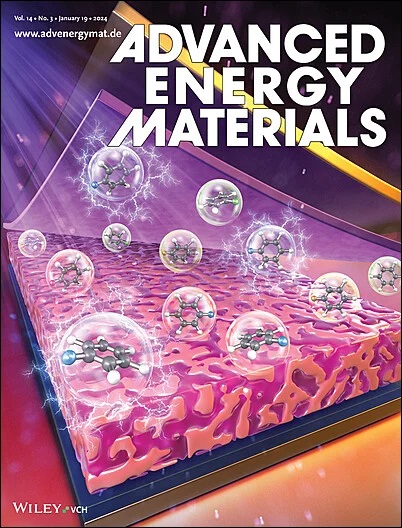Moderately Solvating Electrolyte with Fluorinated Cosolvents for Lean‐Electrolyte Li–S Batteries
IF 24.4
1区 材料科学
Q1 CHEMISTRY, PHYSICAL
引用次数: 0
Abstract
To surpass the energy density limit of current Li–S batteries, attaining a long lifespan under lean‐electrolyte conditions is imperative. The persistent challenge involves suppressing electrolyte decomposition while facilitating sulfur electrode reaction. In this study, the solvating power of 1dimethoxy ethane is fine‐tuned, the main solvent, using fluorinated ether cosolvents via H–F interactions. As the fluorination degree of the cosolvent increases, the coordination of anions around the Li‐ion increases, and the solubilities of Li polysulfides decrease. By systematically varying the solvating power, moderately solvating electrolytes are prepared that can effectively suppress the dissolution of Li polysulfides without hindering the redox kinetics. The moderately solvating electrolytes induce uniform Li deposition and reduce electrolyte decomposition owing to the formation of anion‐derived solid electrolyte interphase. An assembled pouch‐type Li–S battery containing an electrolyte with an optimized solvation power delivers 405 Wh kg求助全文
约1分钟内获得全文
求助全文
来源期刊

Advanced Energy Materials
CHEMISTRY, PHYSICAL-ENERGY & FUELS
CiteScore
41.90
自引率
4.00%
发文量
889
审稿时长
1.4 months
期刊介绍:
Established in 2011, Advanced Energy Materials is an international, interdisciplinary, English-language journal that focuses on materials used in energy harvesting, conversion, and storage. It is regarded as a top-quality journal alongside Advanced Materials, Advanced Functional Materials, and Small.
With a 2022 Impact Factor of 27.8, Advanced Energy Materials is considered a prime source for the best energy-related research. The journal covers a wide range of topics in energy-related research, including organic and inorganic photovoltaics, batteries and supercapacitors, fuel cells, hydrogen generation and storage, thermoelectrics, water splitting and photocatalysis, solar fuels and thermosolar power, magnetocalorics, and piezoelectronics.
The readership of Advanced Energy Materials includes materials scientists, chemists, physicists, and engineers in both academia and industry. The journal is indexed in various databases and collections, such as Advanced Technologies & Aerospace Database, FIZ Karlsruhe, INSPEC (IET), Science Citation Index Expanded, Technology Collection, and Web of Science, among others.
 求助内容:
求助内容: 应助结果提醒方式:
应助结果提醒方式:


